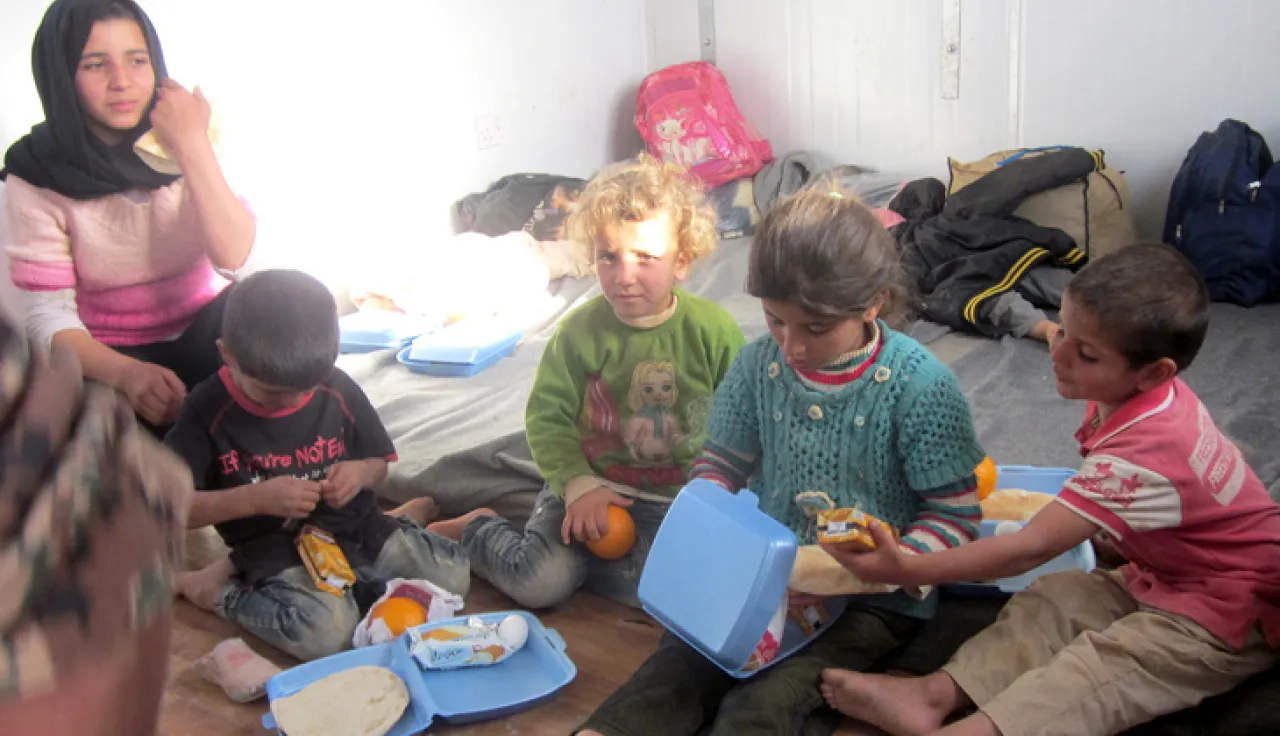As the Syrian crisis enters its fifth year, the hardships endured by millions of people in Syria and neighbouring countries continue to grow. According to recent figures, the number of Syrian refugees in Jordan stands at almost 680,000, with approximately 85% of them living in host communities.
In an effort to address the humanitarian needs of Syrian refugees in Jordan, the International Committee of the Red Cross (ICRC) has continued providing the newly arriving Syrians, who stay initially at four ICRC-supported transit facilities in the north-eastern border area, with often daily essential assistance, including three cooked meals per day, drinking water, blankets, mattresses, hygiene items and basic medical supplies.
In cooperation with the Jordan Red Crescent Society (JRCS), the ICRC has continued providing monthly cash assistance to Syrian refugees living in host communities, since the refugees gradually use up their savings and other resources.
In Zaatari and Azraq refugee camps, the ICRC has been providing free international phone calls for thousands of Syrians, so they can restore contact with their families inside Syria and elsewhere.
The protracted Syrian crisis has affected not only the Syrian refugees but also their host communities in Jordan. The influx of refugees has overstretched Jordan's infrastructure and public services, increasing the demand on housing, food, energy, water and sanitation.

North-eastern border area: The ICRC supports the Royal Medical Services in providing health care to Syrian refugees at the health post in Hadalat transit facility. CC BY-NC-ND / ICRC /Asil Sari
Facts and figures – January to April
Emergency aid
- The ICRC provided Syrian refugees in Hadalat, Rukban, Bustana and Rweyshid transit facilities in the north-eastern border area with approximately 100,000 meals, 39,900 high-energy biscuit bars and 19,200 sweet biscuit bars.
- The ICRC delivered around 14,000 bottles of water, 300 blankets, 7,500 bars of soap, 2,000 bottles of shampoo, 12,500 nappies, 8,380 sanitary towels and 50 jerrycans to Syrian refugees in the four transit facilities.
Water and sanitation
- The ICRC provided cleaning services for tents, shelter caravans and sanitary facilities at Hadalat, Rukban, Bustana and Rweyshid transit facilities and regularly supplied water. Water was regularly supplied to the berm near the border at Hadalat and Rukban transit facilities.
- As a winterization measure, the ICRC trucked over 6,000 litres of diesel to generators at the four transit facilities.
- The ICRC installed prefabricated caravans at three health posts in Rukban, Bustana and Rweyshid transit facilities.
- Construction work on pump stations, water treatment plants and transmission pipelines, as well as upgrading of wells, was completed at the North Badia sites of Sabha, Rawdat Basma, Amra wa Omera, Mukifta, Bustanah, Deir Al Kahaf, Rweyshid and Al Hurra.
- At Tal Shehab health facility, the ICRC upgraded electrical facilities and provided waste management containers.
Health
- Jordanian Royal Medical Services at four ICRC-supported health posts offering health care to Syrian refugees in Hadalat, Rukban, Bustana and Tal Shehab received medical supplies, medical furniture and technical support.
- Through the ICRC-run medical facility at Raba'a Al Sarhan Registration Centre in Mafraq, some 6,450 Syrian refugees received medical screening, some 1,520 of the refugees benefited from clinical services, and around 540 of the Syrians were transferred by ambulance to other health facilities.
- Basic first aid training sessions were held for Syrian refugees in three locations: 37 sessions for 1,145 individuals in Zaatari camp, four sessions for 120 people in Azraq camp and one session for 45 participants n Cyber City camp.
- A course on pre-hospital care and another on first aid and stabilization were held for 52 Syrian health-care providers involved in the management of casualties from the Syrian conflict.
Restoring contact between family members
- With support from JRCS volunteers, around 18,100 Syrian refugees in Zaatari and Azraq camps maintained contact with family members inside Syria and elsewhere, through free international phone calls.
- The ICRC issued 204 travel documents to refugees granted resettlement in third countries.
Working in partnership with the JRCS
- Some 3,000 Syrian refugees living in host communities in Mafraq and Madaba governorates received monthly cash assistance as part of an ICRC-JRCS programme.
- The ICRC and the JRCS jointly offered 11 first aid sessions for 258 Syrians in host communities, and four sessions for 114 Jordanians. The ICRC held three first aid sessions for 91 JRCS volunteers. The ICRC offered three first aid sessions for 69 participants from different NGOs.
- Some 140 needy Syrian and Jordanian women are receiving training, funded by the ICRC, in hairdressing, computer skills, sewing, and basic first aid at the JRCS vocational training centre.
Promotion of international humanitarian law
- The ICRC financially supported a National Committee for Demining and Rehabilitation programme designed to raise awareness among Syrian refugees currently residing in northern Jordan of the risks posed by unexploded ordnance and other remnants of war.
- In accordance with its mandate, the ICRC organized a three-day training session in Amman on the conduct of hostilities, with a view to raising awareness of and enhancing respect for international humanitarian law in times of war in Syria.
For further information, please contact:
Hala Shamlawi, ICRC Amman, tel: +962 777 398 794
Dibeh Fakhr, ICRC Geneva, tel: +41 22 730 37 23 or +41 79 447 37 26




